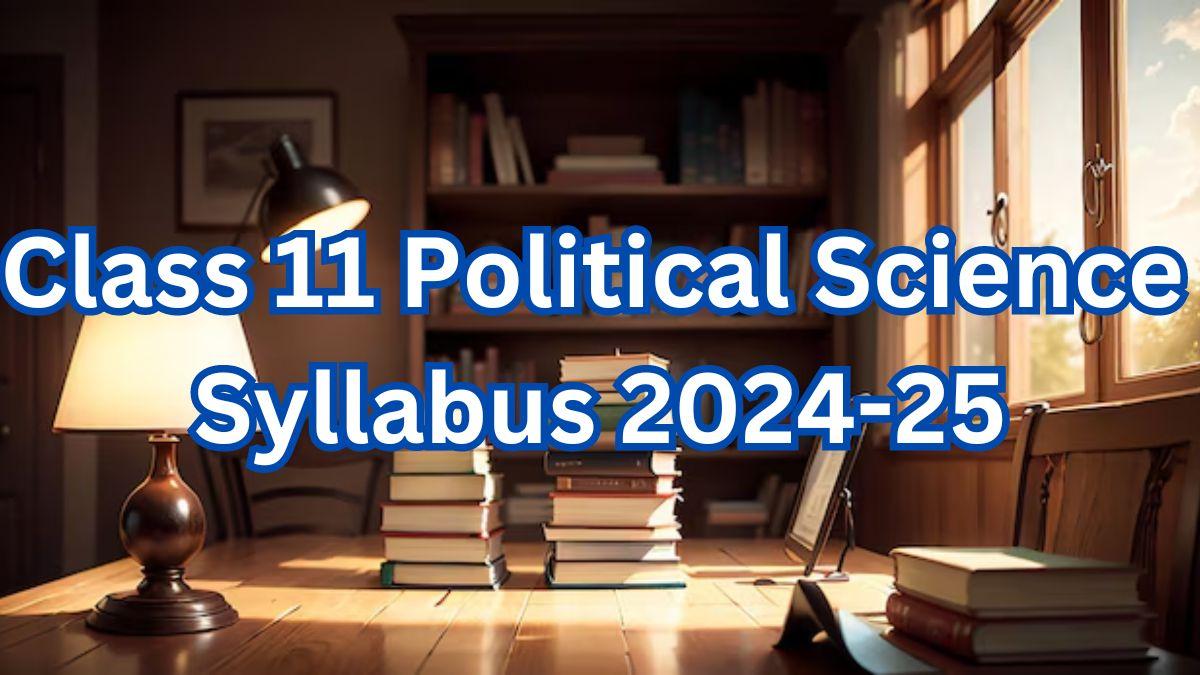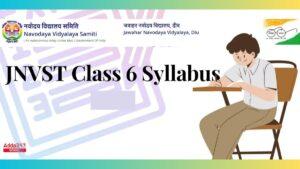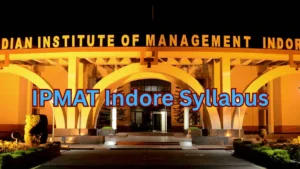The Political Science Class 11 Syllabus 2024-25 for the CBSE board has been made public. All the students who are going to take class 11 annual examinations in political science can download the official syllabus to prepare for the final examination. The syllabus for Class 11 Political Science in 2024-25 highlights the main concepts covered in the Indian Constitution and Political Theory, providing solid foundational knowledge for understanding the realm of politics.
Political Science Class 11 Syllabus 2024-25
The Class 11 Political Science syllabus 2024-25 is the official document that guide students about what topics to study and how much. The official Political Science Class 11 Syllabus 2024-25 CBSE Board s contains the topics that are asked in the exam along with the marking scheme for every unit and chapter. In this way, students can be ensured that they study only the relevant topics for the exam, helping them score good marks. Students can download the official syllabus PDF here.
CBSE Class 11 Political Science Syllabus 2024-25
The syllabus class 11 political science 2024-25 is divided into two parts: PART A- INDIAN CONSTITUTION AT WORK and PART B- POLITICAL THEORY. The entire syllabus accounts for the 80 marks theory exam. A total of 18 chapters (10 from part A and 8 from part B) are present in the class 11 official syllabus of CBSE.
The CBSE Class 11 Political Science Syllabus for 2024-25 will help students get ready for annual exams and competitive exams such as SSC or UPSC. Students need to ensure they study the assigned material for each topic to gain a complete understanding of the subject.
Class 11 Political Science Marking Scheme
The chapter-wise weightage for each and every unit included in the class 11 political science syllabus 2024-25 of CBSE is provided hereunder.
| Chapter Number | Name of the Chapter | Allotted Marks |
| Part A – Indian Constitution at Work | ||
| 1 | Constitution: Why and How? | 08 |
| 2 | Rights in the Indian Constitution | |
| 3 | Election and Representation | 06 |
| 4 | Executive | 12 |
| 5 | Legislature | |
| 6 | Judiciary | |
| 7 | Federalism | 06 |
| 8 | Local Governments | 04 |
| 9 | Constitution as a Living Document | 04 |
| 10 | The Philosophy of the Constitution | |
| Part B – Political Theory | ||
| 1 | Political Theory: An Introduction | 04 |
| 2 | Freedom | 12 |
| 3 | Equality | |
| 4 | Social Justice | 06 |
| 5 | Rights | 04 |
| 6 | Citizenship | 08 |
| 7 | Nationalism | |
| 8 | Secularism | 06 |
| Total | 80 | |
Detailed Syllabus Class 11 Political Science 2024-25
Students can check the detailed syllabus for every chapter of the class xi political science syllabus 2024-25 subject herein.
Part A – Indian Constitution at Work
Chapter 1- Constitution: Why and How?
a) Why do we need a Constitution?
- Constitution allows coordination and assurance
- Specification of decision making powers
- Limitations on the powers of government
- Aspirations and goals of a society
- Fundamental identity of a people
b) The authority of a Constitution
- Mode of promulgation
- The substantive provisions of a constitution
- Balanced institutional design
c) How was the Indian Constitution made?
- Composition of the Constituent Assembly
- Procedures
- Inheritance of the nationalist movement
- Institutional arrangements
d) Provisions adapted from Constitutions of different countries
Chapter 2- Rights in the Indian Constitution
a) The importance of rights
- Bill of Rights
b) Fundamental rights in the Indian Constitution
- Right to Equality
- Right to Freedom
- Right against Exploitation
- Right to Freedom of Religion
- Cultural and Educational Rights
- Right to Constitutional Remedies
c) Directive principles of state policy
- what do the directive principles contain?
d) Relationship between fundamental rights and directive principles
Chapter 3- Election and Representation
a) Elections and democracy
b) Election system in India
- First Past the Post System
- Proportional Representation
c) Why did India adopt the FPTP system?
d) Reservation of constituencies
e) Free and fair elections
- Universal franchise and right to contest
- Independent Election Commission
f) Electoral Reforms
Chapter 4- Executive
a) What is an executive?
b) What are the different types of executives?
c) Parliamentary executive in India
- Power and position of President
- Discretionary Powers of the President
d) Prime Minister and Council of ministers
e) Permanent Executive: Bureaucracy
Chapter 5- Legislature
a) Why do we need a parliament?
b) Why do we need two houses of parliament?
- Rajya Sabha
- Lok Sabha
c) What does the parliament do?
- Powers of Rajya Sabha
- Special Powers of Rajya Sabha
d) How does the parliament make laws?
e) How does the parliament control the executive?
f) What do the committees of parliament do?
g) How does the parliament regulate itself?
Chapter 6- Judiciary
a) Why do we need an independent judiciary
- Independence of Judiciary
- Appointment of Judges
- Removal of Judges
b) Structure of the Judiciary
c) Jurisdiction of supreme Court
- Original Jurisdiction
- Writ Jurisdiction
- Appellate Jurisdiction
- Advisory Jurisdiction
d) Judicial Activism
e) Judiciary and Rights
f) Judiciary and Parliament
Chapter 7- Federalism
a) What is Federalism?
b) Federalism in the Indian Constitution
- Division of Powers
c) Federalism with a strong central government
d) Conflicts in India’s federal system
- Centre-State Relations
- Demands for Autonomy
- Role of Governors and President’s Rule
- Demands for New States
- Interstate Conflicts
e) Special provisions
- Jammu and Kashmir
Chapter 8- Local Governments
a) Why local governments?
b) Growth of Local Government in India
- Local Governments in Independent India
c) 73rd and 74th amendments
d) 73rd Amendment
- Three Tier Structure
- Elections
- Reservations
- Transfer of Subjects
- State Election Commissioners
- State Finance Commission
e) 74th Amendment
f) Implementation of 73rd and 74th Amendments
Chapter 9- Constitution as a Living Document
a) Are constitutions static?
b) How to amend the constitution?
c) Why have there been so many amendments?
d) Contents of amendments made so far
- Differing Interpretations
- Amendments through Political Consensus
- Controversial Amendments
e) Basic structure and evolution of the constitution
f) Constitution as a Living Document
- Contribution of the Judiciary
- Maturity of the Political Leadership
Chapter 10- The Philosophy of the Constitution
a) What is meant by philosophy of the constitution
- Constitution as Means of Democratic Transformation
b) Why do we need to go back to the Constituent Assembly?
c) What is the political philosophy of our constitution
- Individual freedom
- Social Justice
- Respect for diversity and minority rights
- Secularism
- Universal franchise
- Federalism
- National identity
d) Procedural Achievements
e) Criticisms
f) Limitations
Class 11 Political Science Syllabus 2024-25 PDF Download
The official PDF for the CBSE Class 11 Political Science issued by the CBSE on its official website has been provided below. Students are advised to keep this PDF with themselves always for reference purposes.
Download CBSE Class 12 Political Science Syllabus 2024-25 PDF
Importance of class 11 political science syllabus 2024-25
When preparing for studies, students must have the CBSE 11th Political Science Syllabus as a crucial resource. In the most recent CBSE Syllabus for 2024-25, students must stay updated with the newest modifications in the syllabus. Students getting ready for the CBSE 11th 2024-25 Political Science examinations should make sure to carefully review all the recent Class 11 Political Science curriculum modifications. Benefits of downloading the syllabus is:
- Provide students with the skills to analyze political ideas, assess arguments, and develop their own educated viewpoints.
- Motivate students to grasp their duties and privileges as members of society, and how they can engage actively in the political system.
- Offer a thorough insight into the Indian Constitution, its fundamental principles, and its influence on Indian politics.
- Familiarize students with different political ideologies, intellectuals, and historical events that have influenced our perception of government.
- Improve the skill to express political thoughts effectively, briefly, and convincingly, both through writing and speaking.
- Motivate students to examine modern political topics by grasping international political systems and current events affecting both India and the global community.










 CUET BEd Syllabus 2026, Check Subject Wi...
CUET BEd Syllabus 2026, Check Subject Wi...
 Navodaya Syllabus for 6th Class PDF Down...
Navodaya Syllabus for 6th Class PDF Down...
 IPMAT Indore Syllabus 2026: Section-wise...
IPMAT Indore Syllabus 2026: Section-wise...









